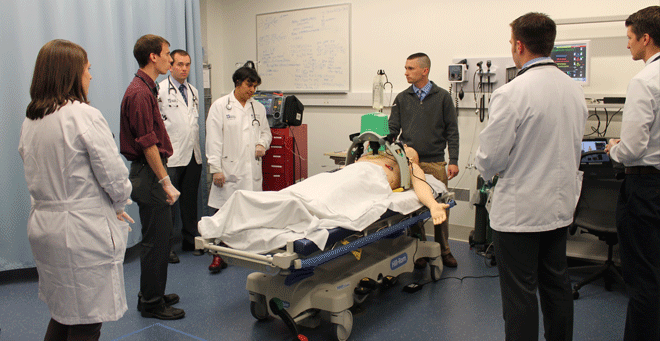 |
|
|
The new School of Medicine training will rely heavily upon performance driven, hands-on, active learning experiences in which simulated encounters with standardized patients and manikin-based simulators are used. |
UMass Medical School announced today that it is incorporating into its curriculum for the current academic year specific training in support of 10 agreed-upon core competencies for the prevention and management of prescription drug misuse.
“We commend the urgency with which Governor Baker’s administration has addressed the many facets of this opioid crisis,” said Chancellor Michael F. Collins. “In response to the governor’s call, UMass Medical School has acted swiftly to review and enhance our curriculum to include the teaching of these core competencies to our current students, so they will develop strong skills and a foundation of knowledge as they begin their careers as physicians.”
“As the commonwealth’s only public medical school, our mission of service to our communities and neighbors has galvanized us to do our part to stem the opioid crisis that is claiming too many lives and destroying too many families,” said School of Medicine Dean Terence R. Flotte.
At the governor’s request, deans of the state’s four medical schools came together with representatives of the Massachusetts Medical Society and the state’s Department of Public Health to reach consensus on best practices, which were publicly announced earlier this month. These 10 core competencies include the ability to evaluate a patient’s level of pain and risk of addiction; various patient-centered treatment options; evidence-based pain management; and the appropriate use of naloxone.
The initial phase of the program at UMass Medical School will include intensive, performance-based training to provide all medical students with an opportunity to both learn and practice these skills. Ultimately, this training will ensure that all School of Medicine graduates are prepared to be “sound prescribers” in the screening, prevention and management of prescription drug misuse.
At UMass Medical School in particular, training will rely heavily upon performance driven, hands-on, active learning experiences in which simulated encounters with standardized patients and manikin-based simulators are used to replicate real world interactions that future physicians will experience in diverse patient care settings.
Multiple scenarios will be designed to address specific competencies, with a particular focus on skills development, such as observational skills; communication and interpersonal dynamics; prescription planning and writing; patient education and counseling; administration of Narcan rescue; and effective use of tools such as drug urine screening and evidence-based screening. Importantly, individual feedback and skills assessment, as well as group debriefing, are included.
This initial phase is part of a longitudinal educational program that will establish a fully integrated curriculum to comprehensively teach and assess all 10 core competencies.
“We have decades of experience and a track record of national recognition in the use of standardized patient and performance-based teaching and assessment,” said Dean Flotte. “This approach represents the gold standard for objective evaluation of medical students.”
“It is our hope that this training model that was developed in response to the recommendations of Governor Baker’s administration and the medical school deans working group will become a national model to address the current and future opioid crises,” said Chancellor Collins.
These additions to the School of Medicine curriculum will impact students in the current academic year.
According to state DPH data, in the first half of 2015 more than 110 people each month, on average, died from an opioid overdose, representing the highest opioid-related death rate ever recorded in Massachusetts.